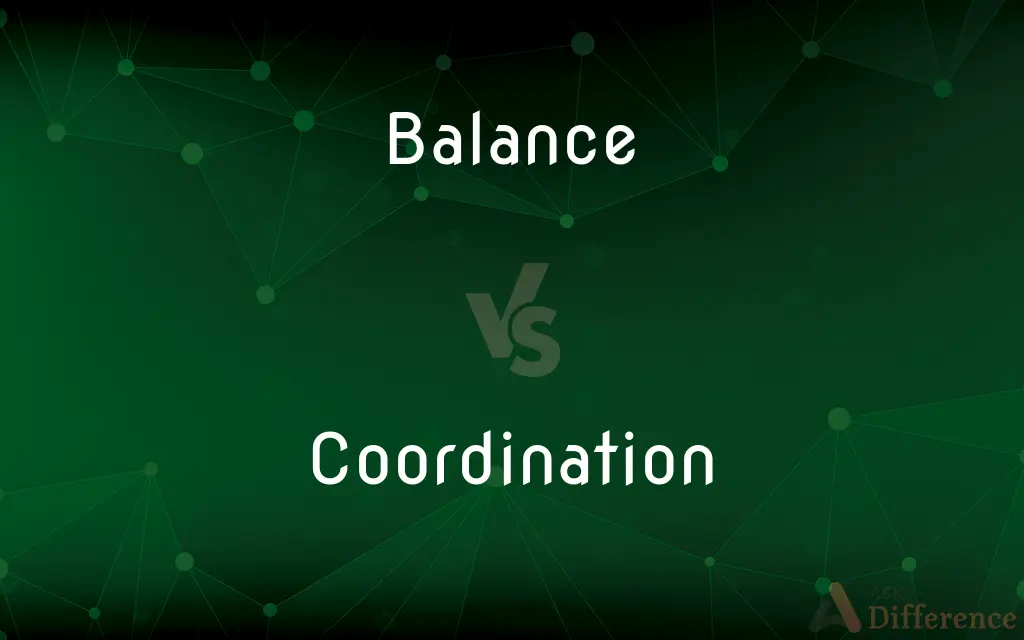Balance vs. Coordination — What's the Difference?
By Urooj Arif & Fiza Rafique — Updated on March 21, 2024
Balance is the ability to maintain a controlled body position during task performance, while coordination is the smooth and efficient movement patterns in response to external demands, involving the harmonious function of sensory and motor systems.

Difference Between Balance and Coordination
Table of Contents
ADVERTISEMENT
Key Differences
Balance refers to the ability to stay upright and steady, whether you're moving or standing still. It involves the complex interplay between the visual system, vestibular system (inner ear balance), and proprioception (sense of body position). On the other hand, coordination is about how well your body parts move in response to your intentions and environmental demands. It requires the integration of multiple body parts and sensory inputs to achieve fluid, precise movements.
When discussing balance, it's often about the physical equilibrium and stability, crucial for daily activities and athletic performance. It allows individuals to maintain positions or move confidently without falling. Coordination, whereas, emphasizes the timing and smoothness of movements, such as those needed to play a musical instrument, type, or participate in sports.
Both balance and coordination are foundational elements of physical fitness and are essential for performing complex movements efficiently and safely. While balance focuses on maintaining postural control, coordination is about the effectiveness and efficiency of movement patterns across different tasks and environments.
Improving balance can be as simple as standing on one leg or as complex as performing dynamic movements on unstable surfaces. Coordination improvement often involves practicing specific skill sets that require precise timing and movement, such as juggling or playing sports that demand quick, accurate responses.
Understanding the difference between balance and coordination is essential for developing training programs, rehabilitating injuries, and improving overall physical performance. While closely related, each targets different aspects of movement and requires specific strategies for enhancement.
ADVERTISEMENT
Comparison Chart
Definition
Ability to maintain a controlled body position.
Smooth and efficient movement patterns.
Key Systems Involved
Visual, vestibular, proprioceptive.
Sensory and motor systems.
Focus
Stability and equilibrium.
Harmony and efficiency in movement.
Importance in Fitness
Essential for posture and preventing falls.
Crucial for achieving fluid, precise movements.
Improvement Methods
Standing on one leg, balance training exercises.
Practicing specific skills, playing sports.
Compare with Definitions
Balance
Ability to stay upright or steady.
Balance exercises can help prevent falls in the elderly.
Coordination
Integration of sensory and motor skills.
Catching a ball involves eye-hand coordination.
Balance
Keeping physical stability under changing conditions.
Ice skating demands good balance on slippery surfaces.
Coordination
Efficient combination of movements.
Soccer requires coordination for dribbling, passing, and shooting.
Balance
Equilibrium between opposing forces.
Tightrope walkers exhibit exceptional balance.
Coordination
Skillful management of body movements.
Martial arts develop coordination through precise strikes and blocks.
Balance
Control of body position in space.
Gymnasts require excellent balance for their routines.
Coordination
Harmonious functioning of body parts.
Coordination is key to playing the piano well.
Balance
Maintaining stability of the body's position.
Yoga improves your balance through various poses.
Coordination
Smooth transition between movements.
Dancers achieve coordination through rigorous practice.
Balance
See Libra.
Coordination
The act of coordinating.
Balance
A weighing device, especially one consisting of a rigid beam horizontally suspended by a low-friction support at its center, with identical weighing pans hung at either end, one of which holds an unknown weight while the effective weight in the other is increased by known amounts until the beam is level and motionless. Also called scale.
Coordination
The state of being coordinate; harmonious adjustment or interaction.
Balance
A state of equilibrium or parity characterized by cancellation of all forces by equal opposing forces.
Coordination
(Physiology) Harmonious functioning of muscles or groups of muscles in the execution of movements.
Balance
The power or means to decide
Matters that fell outside the judge's balance.
Coordination
(Grammar) The linking of two syntactically equal units, as by a coordinate conjunction.
Balance
A state of bodily equilibrium
Thrown off balance by a gust of wind.
Coordination
The act of coordinating, making different people or things work together for a goal or effect.
Balance
The ability to maintain bodily equilibrium
Gymnasts must have good balance.
Coordination
The resulting state of working together; cooperation; synchronization.
Balance
A harmonious or satisfying arrangement or proportion of parts or elements, as in a design.
Coordination
The ability to coordinate one's senses and physical movements in order to act skillfully.
I'm terrible at sports; I have no coordination.
Balance
An influence or force tending to produce equilibrium; counterpoise.
Coordination
(possibly archaic) the state of being equal in rank or power.
Balance
The difference in magnitude between opposing forces or influences.
Coordination
(grammar) An equal joining together of two or more phrases or clauses, for example, using and, or, or but.
Balance
Equality of totals in the debit and credit sides of an account.
Coordination
(chemistry) The reaction of one or more ligands with a metal ion to form a coordination compound.
Balance
The difference between such totals, either on the credit or the debit side.
Coordination
The act of coördinating; the act of putting in the same order, class, rank, dignity, etc.; as, the coördination of the executive, the legislative, and the judicial authority in forming a government; the act of regulating and combining so as to produce harmonious results; harmonious adjustment; as, a coördination of functions.
Balance
Something that is left over; a remainder.
Coordination
The state of being coördinate, or of equal rank, dignity, power, etc.
In this high court of parliament, there is a rare coördination of power.
Balance
(Chemistry) Equality of mass and net electric charge of reacting species on each side of an equation.
Coordination
The skillful and effective interaction of movements
Balance
(Mathematics) Equality with respect to the net number of reduced symbolic quantities on each side of an equation.
Coordination
The regulation of diverse elements into an integrated and harmonious operation
Balance
A balance wheel.
Coordination
The grammatical relation of two constituents having the same grammatical form
Balance
To determine the weight of (something) in a weighing device.
Balance
To consider and compare or assess
Balanced the pros and cons before making a choice.
Balance
To bring into or maintain in a state of equilibrium.
Balance
To act as an equalizing weight or force to; counterbalance.
Balance
To compute the difference between the debits and credits of (an account).
Balance
To reconcile or equalize the sums of the debits and credits of (an account).
Balance
To settle (an account, for example) by paying what is owed.
Balance
To bring into or keep in equal or satisfying proportion or harmony.
Balance
Mathematics & Chemistry To bring (an equation) into balance.
Balance
To move toward and then away from (a dance partner).
Balance
To be in or come into equilibrium.
Balance
To be equal or equivalent.
Balance
To sway or waver as if losing or regaining equilibrium.
Balance
To move toward and then away from a dance partner.
Balance
(uncountable) A state in which opposing forces harmonise; equilibrium.
Balance
(uncountable) Mental equilibrium; mental health; calmness, a state of remaining clear-headed and unperturbed.
Balance
Something of equal weight used to provide equilibrium; counterweight.
These weights are used as a balance for the overhanging verandah
Blair thought he could provide a useful balance to Bush's policies.
Balance
A pair of scales.
Balance
(uncountable) Awareness of both viewpoints or matters; neutrality; rationality; objectivity.
Balance
(uncountable) The overall result of conflicting forces, opinions etc.; the influence which ultimately "weighs" more than others.
The balance of power finally lay with the Royalist forces.
I think the balance of opinion is that we should get out while we're ahead.
Balance
(uncountable) Apparent harmony in art (between differing colours, sounds, etc.).
Balance
(accounting) A list accounting for the debits on one side, and for the credits on the other.
Balance
(accounting) The result of such a procedure; the difference between credit and debit of an account.
I just need to nip to a bank and check my balance.
Balance
(watchmaking) A device used to regulate the speed of a watch, clock etc.
Balance
The remainder.
The balance of the agreement remains in effect.
The invoice said he had only paid $50. The balance was $220.
Balance
Libra.
Balance
(transitive) To bring (items) to an equipoise, as the scales of a balance by adjusting the weights.
Balance
To make (concepts) agree.
Balance
(transitive) To hold (an object or objects) precariously; to support on a narrow base, so as to keep from falling.
I balanced my mug of coffee on my knee.
The circus performer balances a plate on the end of a baton.
Balance
(transitive) To compare in relative force, importance, value, etc.; to estimate.
Balance
To move toward, and then back from, reciprocally.
To balance partners
Balance
(nautical) To contract, as a sail, into a narrower compass.
To balance the boom mainsail
Balance
(transitive) To make the credits and debits of (an account) correspond.
This final payment, or credit, balances the account.
To balance a set of books
Balance
(intransitive) To be in equilibrium.
Balance
(intransitive) To have matching credits and debits.
Balance
To weigh in a balance.
Balance
To hesitate or fluctuate.
Balance
An apparatus for weighing.
Balance
Act of weighing mentally; comparison; estimate.
A fair balance of the advantages on either side.
Balance
Equipoise between the weights in opposite scales.
Balance
The state of being in equipoise; equilibrium; even adjustment; steadiness.
And hung a bottle on each sideTo make his balance true.
The order and balance of the country were destroyed.
English workmen completely lose their balance.
Balance
An equality between the sums total of the two sides of an account; as, to bring one's accounts to a balance; - also, the excess on either side; as, the balance of an account.
I still think the balance of probabilities leans towards the account given in the text.
Balance
A balance wheel, as of a watch, or clock. See Balance wheel (in the Vocabulary).
Balance
The constellation Libra.
Balance
To bring to an equipoise, as the scales of a balance by adjusting the weights; to weigh in a balance.
Balance
To support on a narrow base, so as to keep from falling; as, to balance a plate on the end of a cane; to balance one's self on a tight rope.
Balance
To equal in number, weight, force, or proportion; to counterpoise, counterbalance, counteract, or neutralize.
One expression . . . must check and balance another.
Balance
To compare in relative force, importance, value, etc.; to estimate.
Balance the good and evil of things.
Balance
To settle and adjust, as an account; to make two accounts equal by paying the difference between them.
I am very well satisfied that it is not in my power to balance accounts with my Maker.
Balance
To make the sums of the debits and credits of an account equal; - said of an item; as, this payment, or credit, balances the account.
Balance
To arrange accounts in such a way that the sum total of the debits is equal to the sum total of the credits; as, to balance a set of books.
Balance
To move toward, and then back from, reciprocally; as, to balance partners.
Balance
To contract, as a sail, into a narrower compass; as, to balance the boom mainsail.
Balance
To have equal weight on each side; to be in equipoise; as, the scales balance.
Balance
To fluctuate between motives which appear of equal force; to waver; to hesitate.
He would not balance or err in the determination of his choice.
Balance
To move toward a person or couple, and then back.
Balance
A state of equilibrium
Balance
A scale for weighing; depends on pull of gravity
Balance
Equality between the totals of the credit and debit sides of an account
Balance
Harmonious arrangement or relation of parts or elements within a whole (as in a design);
In all perfectly beautiful objects there is found the opposition of one part to another and a reciprocal balance
Balance
Equality of distribution
Balance
Something left after other parts have been taken away;
There was no remainder
He threw away the rest
He took what he wanted and I got the balance
Balance
The difference between the totals of the credit and debit sides of an account
Balance
(astrology) a person who is born while the sun in in Libra
Balance
The seventh sign of the zodiac; the sun is in this sign from about September 23 to October 22
Balance
(mathematics) an attribute of a shape or relation; exact correspondence of form on opposite sides of a dividing line or plane
Balance
An equivalent counterbalancing weight
Balance
A wheel that regulates the rate of movement in a machine; especially a wheel oscillating against the hairspring of a timepiece to regulate its beat
Balance
Bring into balance or equilibrium;
She has to balance work and her domestic duties
Balance the two weights
Balance
Compute credits and debits of an account
Balance
Hold or carry in equilibrium
Balance
Be in equilibrium;
He was balancing on one foot
Common Curiosities
Why is balance important in everyday life?
Balance is crucial for performing daily activities safely and efficiently, such as walking, climbing stairs, and preventing falls.
How does coordination affect athletic performance?
Coordination enhances athletic performance by allowing athletes to execute complex movements more effectively and with greater precision.
Do balance and coordination decline with age?
Yes, both balance and coordination can decline with age, but regular exercise and specific training can mitigate these effects.
Can you have good balance but poor coordination?
Yes, it's possible to maintain good balance while standing still or moving but have difficulty executing coordinated movements involving multiple body parts.
How can I improve my balance and coordination?
Balance can be improved with exercises that challenge your stability, while coordination can be enhanced through practice and repetition of specific movement patterns.
How do balance disorders affect coordination?
Balance disorders can impair coordination by disrupting the body's ability to maintain stability, making it difficult to perform coordinated movements smoothly.
Can balance and coordination training help in injury prevention?
Yes, training for balance and coordination can significantly reduce the risk of injuries by improving stability and movement efficiency.
How are balance and coordination related to each other?
Balance and coordination are interrelated; good balance provides a stable foundation for coordinated movements, and effective coordination can enhance balance by ensuring smooth, controlled movements.
Are there sports that particularly benefit from balance and coordination training?
Sports like gymnastics, martial arts, soccer, and dance greatly benefit from focused balance and coordination training.
What role does the brain play in balance and coordination?
The brain integrates sensory information and coordinates muscle actions to maintain balance and execute coordinated movements.
Share Your Discovery

Previous Comparison
Ebonite vs. Vulcanite
Next Comparison
Radius vs. SphericalAuthor Spotlight
Written by
Urooj ArifUrooj is a skilled content writer at Ask Difference, known for her exceptional ability to simplify complex topics into engaging and informative content. With a passion for research and a flair for clear, concise writing, she consistently delivers articles that resonate with our diverse audience.
Co-written by
Fiza RafiqueFiza Rafique is a skilled content writer at AskDifference.com, where she meticulously refines and enhances written pieces. Drawing from her vast editorial expertise, Fiza ensures clarity, accuracy, and precision in every article. Passionate about language, she continually seeks to elevate the quality of content for readers worldwide.














































